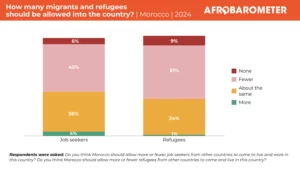Morocco has become a major actor in migration governance, both regionally and globally. In line with its 2014 National Strategy on Immigration and Asylum, the country launched regularisation campaigns designed to legalise the status of undocumented immigrants and expanded their access to public services and voting rights (International Organization for Migration, 2017). It also engaged with the Global Compact for Migration and the African Union’s migration agenda in a bid to align national strategies with broader international norms and frameworks (Kingdom of Morocco, 2022).
Despite these steps, significant challenges persist. Host to nearly 19,000 asylum seekers and refugees, Morocco struggles to integrate them into the labour market, to enforce anti trafficking laws, and to manage internal displacement caused by drought and flooding (UNHCR, 2024). The World Bank (2023) highlights Morocco as needing better alignment between migration flows and development priorities.
Morocco’s human-rights commitments are also in tension with its domestic practices. Jiménez-Alvarez, Espiñeira, and Gazzotti (2021) note that despite progressive rhetoric, many migrants – especially from sub-Saharan Africa – still face arbitrary detention and abuse by Moroccan law enforcement authorities.
Environmental change and social norms inform Moroccans’ own migration decisions. While women often suffer most from droughts and water shortages because of their roles in farming and the household, men are more likely to leave home in search of work, either in the country or abroad (Van Praag, Ou-Salah, Hut, & Zickgraf, 2021). Elliot (2021) adds that even many of those who don’t migrate are affected by migration through remittances from family abroad.
Afrobarometer’s Round 10 survey explored Moroccans’ views on migration. Findings indicate strong support for the free cross-border movement of North Africans for work and trade, though most citizens say that in practice, crossing international borders is difficult.
While assessments of the economic impact of immigration are mixed, Moroccans express largely tolerant attitudes toward foreign workers and, to a lesser extent, refugees. Nonetheless, majorities favour reducing the number of immigrants and refugees allowed into the country.
Nearly half of adults say they have considered emigrating, mostly in pursuit of better economic opportunities, with Europe and North America as the most preferred destinations.
